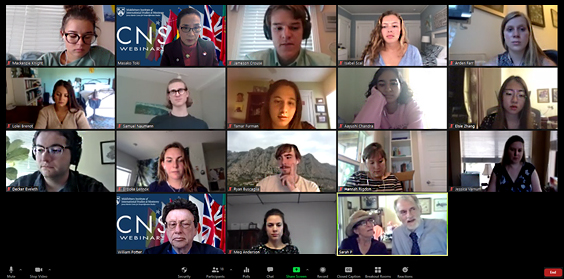August 10, 2020
Masako Toki
The James Martin Center for Nonproliferation Studies (CNS) hosted a three-week-long Summer Online Training for the Undergraduate Fellowship in Nonproliferation Studies from July 13–July 31, 2020. This was the first Undergraduate Fellowship conducted entirely online, a pivot necessitated by the COVID-19 pandemic.

Despite the initial challenges of adapting the regular summer program into a fully virtual training—to be followed by a semester-long mentorship program and a January term in-person training*—this unique, undergraduate program provided an academically rigorous, enriching, and innovative program for fourteen select undergraduate students.
Participating students represent some of the nation’s top schools, including: Middlebury College, the College of William and Mary, Cornell University, University of Michigan, University of Virginia, Ohio State University, Reed College, Indiana University Bloomington, Bryn Mawr College, University of Georgia, and University of Southern California.
During the intensive three-week online training, fellows participated in a series of lectures on issues relating to nonproliferation, disarmament, and arms control, including an overview of international nonproliferation regimes, US-Russia nonproliferation issues, and regional proliferation challenges. The lectures also covered current challenges in nuclear disarmament, export controls, open-source tools for nonproliferation, and the media and nonproliferation. One of the highlights of the online summer training was an arms-control negotiation simulation on North Korea’s nuclear threats. Undergraduate fellows were assigned to realistically represent one of six countries in a high-stakes emergency summit, including the United States, North Korea, South Korea, Russia, China, and Japan.
In addition to lectures, fellows had opportunities to receive career advice from CNS and other faculty from the Middlebury Institute of International Studies at Monterey. Fellows also had informal “meet-up” sessions with CNS experts to learn more about their areas of expertise.
After the summer online training, each undergraduate fellow will be assigned to a CNS expert mentor who will help guide and inform the fellows’ independent research project, as well as help widen the fellows’ professional networks. The fellows will continue working on these independent research projects through the fall, and deliver their capstone presentation at the end of the January In-Person Training.
At the closing ceremony of the summer training, CNS director Dr. William Potter congratulated fellows on successfully concluding the training and learning variety of nonproliferation topics from CNS experts. Tom and Sarah Pattison, CNS’ longtime friend and strong supporter of the undergraduate program also joined the closing ceremony and emphasized the important role of young generations like the fellows for a more peaceful and secure world.
The Summer 2020 Undergraduate Fellows course provides another example of the agility and creativity with which CNS responded to the global pandemic. By rethinking the possibilities of communication and learning, while remaining steadfast to our commitment to nonproliferation and disarmament education, CNS continues to effectively train future leaders to combat the spread of weapons of mass destruction.
* Contingent upon the COVID situation.
